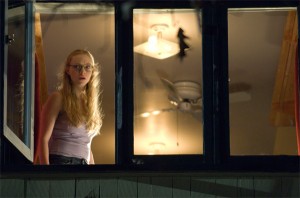Jennifer’s Body
 Do you ever wonder if actors take advice from characters in their films in real life? Like perhaps Bruce Willis deciding that after Die Hard he would no longer walk around barefoot for any reason, you know, just in case terrorists shot up his house and he had to run around and avoid all the glass? Or maybe Ed Norton makes sure to jaywalk wherever he is, so he’s never at the corner of the block, and therefore subject to the curb stomping he gave someone in American History X?
Do you ever wonder if actors take advice from characters in their films in real life? Like perhaps Bruce Willis deciding that after Die Hard he would no longer walk around barefoot for any reason, you know, just in case terrorists shot up his house and he had to run around and avoid all the glass? Or maybe Ed Norton makes sure to jaywalk wherever he is, so he’s never at the corner of the block, and therefore subject to the curb stomping he gave someone in American History X?
What if the lesson isn’t as seemingly important as those more intense and violent films? What about someone like Amanda Seyfried in her role as the dimbulb Karen Smith in Mean Girls; Did she listen to what Rachel McAdams said to Lacey Chabert, where Chabert kept insisting on using the word “fetch” to mean cool or hip, trying to add it to the standard high school lexicon? “Stop trying to make fetch happen! It’s not going to happen!”
 Obviously Seyfried didn’t listen; otherwise she wouldn’t have signed up to play the lead in Diablo Cody’s follow-up to Juno, Jennifer’s Body. Cody inserted phrases like “salty” (which is supposed to mean hot, as in very attractive) or “lesbigay” into the script wherever she could, and since Cody also executive produced Jennifer’s Body, director Karyn Kusema (Girlfight, Aeon Flux) must have had no choice but to keep them in the movie. Or maybe she thought they worked? She’s wrong, because whatever tension or humor that Kusema might have built up in the horror-comedy of Jennifer’s Body is immediately deflated by one of Cody’s “aren’t I clever” moments. Jennifer’s Body is Cody’s turn at trying to remake Heathers, the high school setting, the black comedy, characters who are bold and shallow, the on-the-nose pop song that becomes an anthem for the students, and of course the stylized language, and as mildly ambitious as that sounds, Jennifer’s Body doesn’t work in that vein at all.
Obviously Seyfried didn’t listen; otherwise she wouldn’t have signed up to play the lead in Diablo Cody’s follow-up to Juno, Jennifer’s Body. Cody inserted phrases like “salty” (which is supposed to mean hot, as in very attractive) or “lesbigay” into the script wherever she could, and since Cody also executive produced Jennifer’s Body, director Karyn Kusema (Girlfight, Aeon Flux) must have had no choice but to keep them in the movie. Or maybe she thought they worked? She’s wrong, because whatever tension or humor that Kusema might have built up in the horror-comedy of Jennifer’s Body is immediately deflated by one of Cody’s “aren’t I clever” moments. Jennifer’s Body is Cody’s turn at trying to remake Heathers, the high school setting, the black comedy, characters who are bold and shallow, the on-the-nose pop song that becomes an anthem for the students, and of course the stylized language, and as mildly ambitious as that sounds, Jennifer’s Body doesn’t work in that vein at all.
There are some things that are successful in Jennifer’s Body, Megan Fox, playing the titular character, a manipulative, not-too-bright, highly sexualized teen, who is turned into either a blood-thirsty demon or a vampire after being kidnapped by a struggling indie rock band, nails down Jennifer’s combination of plasticity and self-centered aloofness (especially when she refers to the “boy-run media”), though she may just be playing herself. Seyfried is saddled with the ponytail and glasses nerd character (I wonder if she’s a stunner underneath all of her attempts to hide? Hasn’t Cody seen any other teen romance movie?), given the nickname Needy, as if to hammer the point home further that she’ll be loyal to her boyfriend and her best friend Jennifer as long as she can.
 Cody immerses Jennifer’s Body in so many clichés, probably intentionally, but she doesn’t do anything with them. Opportunities for parody arise, like a funeral scene where Needy is intentionally watching from a distance, instead of integrating herself into the crowd of mourners. Doesn’t Cody realize that people only do this sort of thing in movies, so the camera can capture them looking guilty or mysterious? If you didn’t want to be noticed at a funeral, you’d blend in at the back row of people, not stand a hundred feet away by yourself. And the highly contrived set-up for the conclusion, which leads us to believe that we’re headed towards a Carrie-style prom bloodbath, never even gets to where the prom is being held. The final confrontation is in a mysterious sanctuary with a pool, a setting with no significance and certainly no inherent creepiness.
Cody immerses Jennifer’s Body in so many clichés, probably intentionally, but she doesn’t do anything with them. Opportunities for parody arise, like a funeral scene where Needy is intentionally watching from a distance, instead of integrating herself into the crowd of mourners. Doesn’t Cody realize that people only do this sort of thing in movies, so the camera can capture them looking guilty or mysterious? If you didn’t want to be noticed at a funeral, you’d blend in at the back row of people, not stand a hundred feet away by yourself. And the highly contrived set-up for the conclusion, which leads us to believe that we’re headed towards a Carrie-style prom bloodbath, never even gets to where the prom is being held. The final confrontation is in a mysterious sanctuary with a pool, a setting with no significance and certainly no inherent creepiness.
Even Cody’s plotting is a totally confused mess; the inciting incident for the plot is a fire at a bar where Needy and Jennifer have gone to see a band whose lead singer Jennifer thinks is cute. The fire kills everyone in the bar, a lot for a small town, except for the band, Jennifer, and Needy. The band seems pretty nonplussed by the situation despite people burning all around them and explosions everywhere. This suggests that they might have had something to do with the fire, but there’s a huge disconnect, if the entire purpose of their trip into nowheresville was to burn down a bar so they could kidnap and possibly rape a groupie they didn’t know or expect to be there in the first place. The eventual explanation for why they kidnap Jennifer is the film’s most clever idea, and it’s a shame that we don’t know their reasoning till nearly the end of the movie, as it could have been mined for quite a bit of humor.
 Clearly Cody wanted to engage in commentary on how teenage girls are viewed (there are a lot of menstrual metaphors, not the only thing borrowed from the infinitely superior Ginger Snaps series), how they deal with their burgeoning sexuality, while making a scary, silly movie. Well there’s not a moment in Jennifer’s Body that’s intentionally scary, and the characters never reach beyond the level of stereotype (the jock, the goth kid, the cheerleader, the nerd, etc.), and so the only novel approach is the way the movie is almost accidentally told from Jennifer’s perspective (it’s actually narrated by Needy as she talks to us as a survivor of the experience, an unnecessary framing device that repeatedly cheats and completely undermines the suspense). Rarely does the narcissistic slut get to have her say, she’s always seen from the outside, as opposed to figuring out what makes her tick, whether it’s pure insecurity, confidence, a carpe diem attitude, or any other possibility. If Cody truly had the courage to tell the story (Kusema’s imprint is entirely absent from the film), she would have gone the mean and nasty route that Heathers hinted at, instead of all this self-conscious dialogue and wimpy horror. Jennifer already embraces her power, developing a voracious appetite; why not tell us what she’s thinking amidst all the male gazing? If Cody’s going to capitalize on all this “I was a stripper who wrote a screenplay” nonsense, surely she could tell us a side of the story that only the woman with all the power in the room would know.
Clearly Cody wanted to engage in commentary on how teenage girls are viewed (there are a lot of menstrual metaphors, not the only thing borrowed from the infinitely superior Ginger Snaps series), how they deal with their burgeoning sexuality, while making a scary, silly movie. Well there’s not a moment in Jennifer’s Body that’s intentionally scary, and the characters never reach beyond the level of stereotype (the jock, the goth kid, the cheerleader, the nerd, etc.), and so the only novel approach is the way the movie is almost accidentally told from Jennifer’s perspective (it’s actually narrated by Needy as she talks to us as a survivor of the experience, an unnecessary framing device that repeatedly cheats and completely undermines the suspense). Rarely does the narcissistic slut get to have her say, she’s always seen from the outside, as opposed to figuring out what makes her tick, whether it’s pure insecurity, confidence, a carpe diem attitude, or any other possibility. If Cody truly had the courage to tell the story (Kusema’s imprint is entirely absent from the film), she would have gone the mean and nasty route that Heathers hinted at, instead of all this self-conscious dialogue and wimpy horror. Jennifer already embraces her power, developing a voracious appetite; why not tell us what she’s thinking amidst all the male gazing? If Cody’s going to capitalize on all this “I was a stripper who wrote a screenplay” nonsense, surely she could tell us a side of the story that only the woman with all the power in the room would know.



